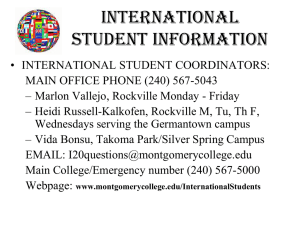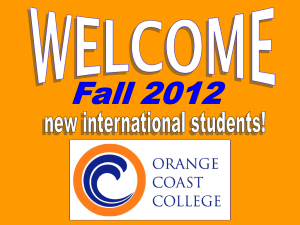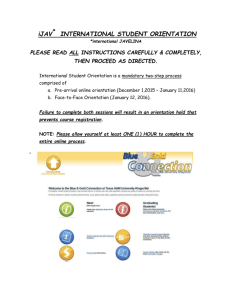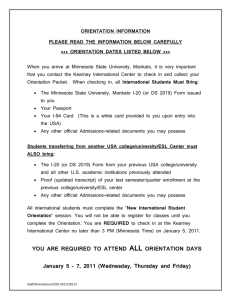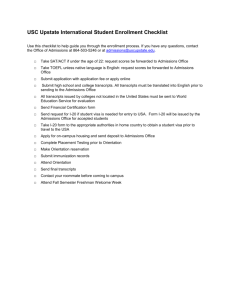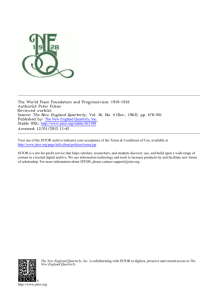Applying for a Student Visa The following provides information you
advertisement
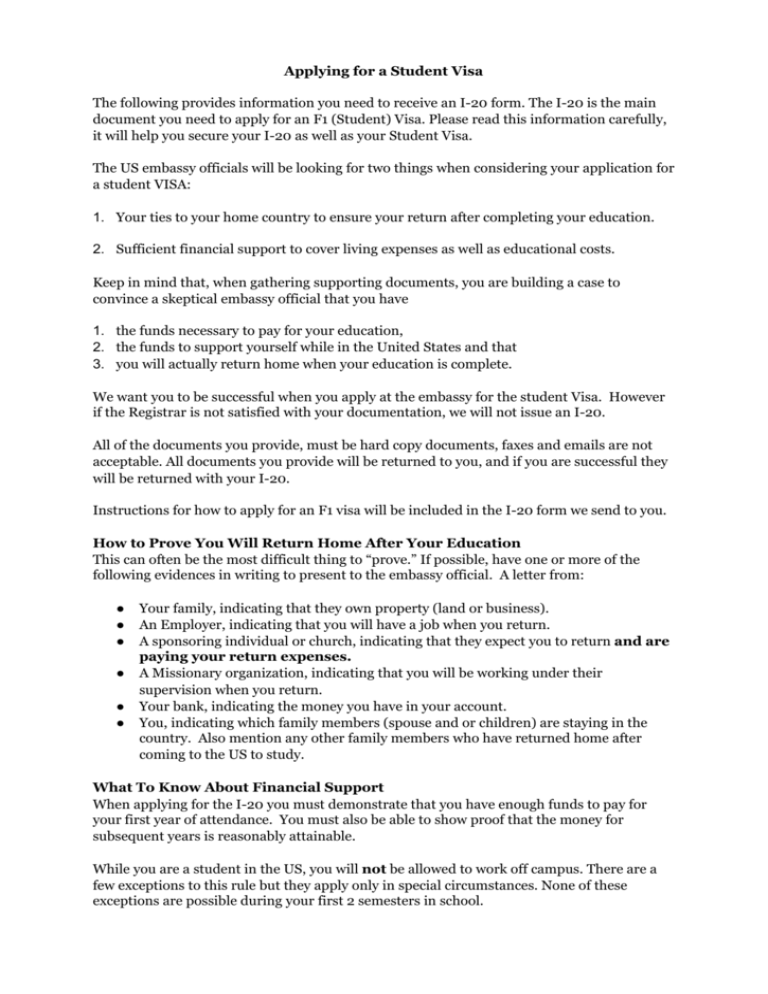
Applying for a Student Visa The following provides information you need to receive an I-20 form. The I-20 is the main document you need to apply for an F1 (Student) Visa. Please read this information carefully, it will help you secure your I-20 as well as your Student Visa. The US embassy officials will be looking for two things when considering your application for a student VISA: 1. Your ties to your home country to ensure your return after completing your education. 2. Sufficient financial support to cover living expenses as well as educational costs. Keep in mind that, when gathering supporting documents, you are building a case to convince a skeptical embassy official that you have 1. the funds necessary to pay for your education, 2. the funds to support yourself while in the United States and that 3. you will actually return home when your education is complete. We want you to be successful when you apply at the embassy for the student Visa. However if the Registrar is not satisfied with your documentation, we will not issue an I-20. All of the documents you provide, must be hard copy documents, faxes and emails are not acceptable. All documents you provide will be returned to you, and if you are successful they will be returned with your I-20. Instructions for how to apply for an F1 visa will be included in the I-20 form we send to you. How to Prove You Will Return Home After Your Education This can often be the most difficult thing to “prove.” If possible, have one or more of the following evidences in writing to present to the embassy official. A letter from: ● ● ● ● ● ● Your family, indicating that they own property (land or business). An Employer, indicating that you will have a job when you return. A sponsoring individual or church, indicating that they expect you to return and are paying your return expenses. A Missionary organization, indicating that you will be working under their supervision when you return. Your bank, indicating the money you have in your account. You, indicating which family members (spouse and or children) are staying in the country. Also mention any other family members who have returned home after coming to the US to study. What To Know About Financial Support When applying for the I-20 you must demonstrate that you have enough funds to pay for your first year of attendance. You must also be able to show proof that the money for subsequent years is reasonably attainable. While you are a student in the US, you will not be allowed to work off campus. There are a few exceptions to this rule but they apply only in special circumstances. None of these exceptions are possible during your first 2 semesters in school. You will be allowed to work for CCU on our campus. CCU does everything possible to help International Students receive on-campus employment. However on-campus employment is not guaranteed. If you have arranged for employment with CCU, you may use the income from that employment as income on your I-20 form. If you have not already arranged employment with CCU, then you cannot use it as income on the I-20. How to Demonstrate Proof of Financial Support Individual Sponsor: Sponsors can complete the affidavit provided by CCU or they can write a letter of support. Sponsorship letters must indicate the amount of funds that will be provided and the duration of that support. The affidavit or sponsorship letter must be notarized (“notarizing” refers to an official seal from a registered public official; your sponsor will need to make the arrangements for the document to be notarized). Individual sponsors must also provide documentation about their income. This support can be documented by any combination of items below: ● ● ● A letter from employer. This letter should indicate the length of employment and annual income. A bank Statement. Should be notarized or stamped by bank. A letter from personal accountant stating annual income, assets, etc. Church or Business / Organization Sponsors: If a church or other organization is providing for part of your educational costs, then they can complete the affidavit or provide a letter sponsorship. Letters must be on official company letterhead. The church or business should also provide a letter from its treasurer or accountant that indicates the financial stability of the company. Student’s Personal Funds: These funds must be divided by the number of years you will attend CCU. Only that amount can apply toward the first year of costs. Example: Student has $10,000 and is applying for a 4 year program. Student must show proof of the entire $10,000. However only $2500 can be applied to the first year’s expenses on the I-20. Scholarship: If you are receiving an International Student Scholarship from CCU, CCU will provide a letter indicating the amount and duration of the scholarship. If you are receiving a scholarship from another organization, please provide the award letter you received. It would also be helpful to have information about this organization, such as its purpose, the size of the organization, how long it has been in existence, its financial stability, and where and how it receives funding. How Much Support Is Needed? (You must show support for all educational and living expenses.) Your educational expenses include: ● Tuition ● Graduate students—Minimum of 18 hours (9 per semester) ● Undergradute students—Mininum of 24 hours (12 per semester). Undergraduate students must take around 16 hours per semester to graduate in four years. ● Books and Supplies ($1,000 per year) ● Fees ($500 per year) For current tuition costs see our Tuition Costs & Financing Your Education pages. Taking the minimum number of hours to be full time will increase living costs by increasing the number of years needed to complete the degree. The above numbers do not include summer school classes. International students often take summer school to reduce the amount of time living in the US. Your Living expenses must cover the following for 12 months: ● Housing ● Food ● Transportation ● Insurance ● Personal Items ● Dependent expenses Living expenses vary greatly depending upon whether the student lives on campus and the number of dependents. A single student living on campus would need $12,000 to cover 12 months. Students living on campus need to make Summer housing arrangements. On campus housing for the summer months is not guaranteed. A single student living off campus would need $18,000. A married student living off campus would need $24,000. Another $3600 would be needed per additional dependent. If someone is providing you a house, an apartment, or room and board in their own home free of charge, then they need to provide CCU with a notarized affidavit showing this support. This will greatly reduce the amount of support you need to demonstrate in terms of actual cash. With this type of arrangement, however, the student must then show support for transportation to and from school. Total support needed ranges from $20,000 to over $35,000 depending upon the student’s situation. You may be able to live with less expense that what is listed about, however you must remember two things: 1 You are trying to convince the American embassy official that you will have sufficient funds to cover all expenses. He or she will be evaluating you from the perspective of what it costs for an American to support him or herself. 2 You do not want to experience the normal stress of completing your course work, as well as added stress concerning how you will care for your family. We have seen students who would have been successful academically, but failed due to the struggle of financial concerns. SEVIS Fee and I -901 Form The Department of Homeland security has established a fee that must be paid before your I-20 will be accepted at the embassy. This fee is currently $200 and must be paid in US funds. $200 of your CCU application fee will be used to cover this cost. A receipt for payment of this fee will be included with your I-20. How We Send the I-20 Once you have been officially accepted to CCU and all your financial documents are in order, the I-20 will be shipped to you via DHL. You will be notified via email of the ship date and a tracking number you can use to monitor the shipment. You must provide a street address to which the I-20 can be shipped. DHL will not deliver to a post office box. You need to provide the registrar (don.thomason@ccunicversity.edu) with your phone number so the local DHL office will be able to contact you via phone if there is a delivery problem. Students who defer attendance to a future semester and require a new I-20 to be sent may be charged additional shipping expenses. Do You Have More Questions? The best way to contact the Registrar (Don Thomason) is via email: don.thomason@ccuniversity.edu. You can also telephone the Registrar (513) 244-8162. Documents can be mailed to the appropriate admissions department or directly to the Registrar. Send to: Cincinnati Christian University Attention: Don Thomason, Primary DSO 2700 Glenway Avenue Cincinnati, OH 45204 USA
